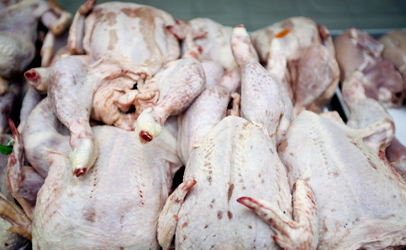Poultry processing plants that do not meet Salmonella control performance standards will have to conduct new follow-up sampling procedures beginning early next year, according to a notice from the USDA’s Food Safety and Inspection Service (FSIS).
 In a Dec. 16 notice, FSIS announced the new follow-up protocol for testing, referred to as sampling by the government, will take effect Jan. 13, 2017. The current performance standards for Salmonella and Campylobacter in not-ready-to-eat comminuted chicken and turkey products, including raw chicken parts, have been in effect since Feb. 11, this year.
In a Dec. 16 notice, FSIS announced the new follow-up protocol for testing, referred to as sampling by the government, will take effect Jan. 13, 2017. The current performance standards for Salmonella and Campylobacter in not-ready-to-eat comminuted chicken and turkey products, including raw chicken parts, have been in effect since Feb. 11, this year.
The current allowable percentage positive rate for carcasses is 9.8 percent for young chicken and 7.1. percent for turkey during any completed 52-week moving window over the past three months.
FSIS has instructed its inspection program personnel (IPP) at poultry operations for young chickens and turkeys on the new procedures. Beginning on the start date next year, if Salmonella levels are exceeded, the poultry plants will be required to schedule carcass follow-up testing as soon as possible.
IPP staff are to inform plant management of the failure to meet the standards and conduct follow-up sampling when assigned by the Public Health Information System (PHIS). Currently the follow-up sampling will focus on carcasses only. Further instructions could expand the program’s target in the future.
The official notice says it is possible a poultry plant might fail during “consecutive moving windows,” but sampling will normally focus only on the “initial failue in a series.” IPP staff are not to “attempt to formally categorize an establishment by tracking their own testing results” since the FSIS Office of Data Integration and Food Protection (ODIFP) will be responsible for “performing this analysis and reporting.”
IPP staff will be responsible for providing the plant with a “sampling alert message” with details on the sampling that will occur. They also will meet with plant management.
ODIFP will conduct the follow-up testing, which is a largely automated process. It does rely on IPP staff collecting the samples, with at leat one per shift suggested.
(To sign up for a free subscription to Food Safety News, click here.)
